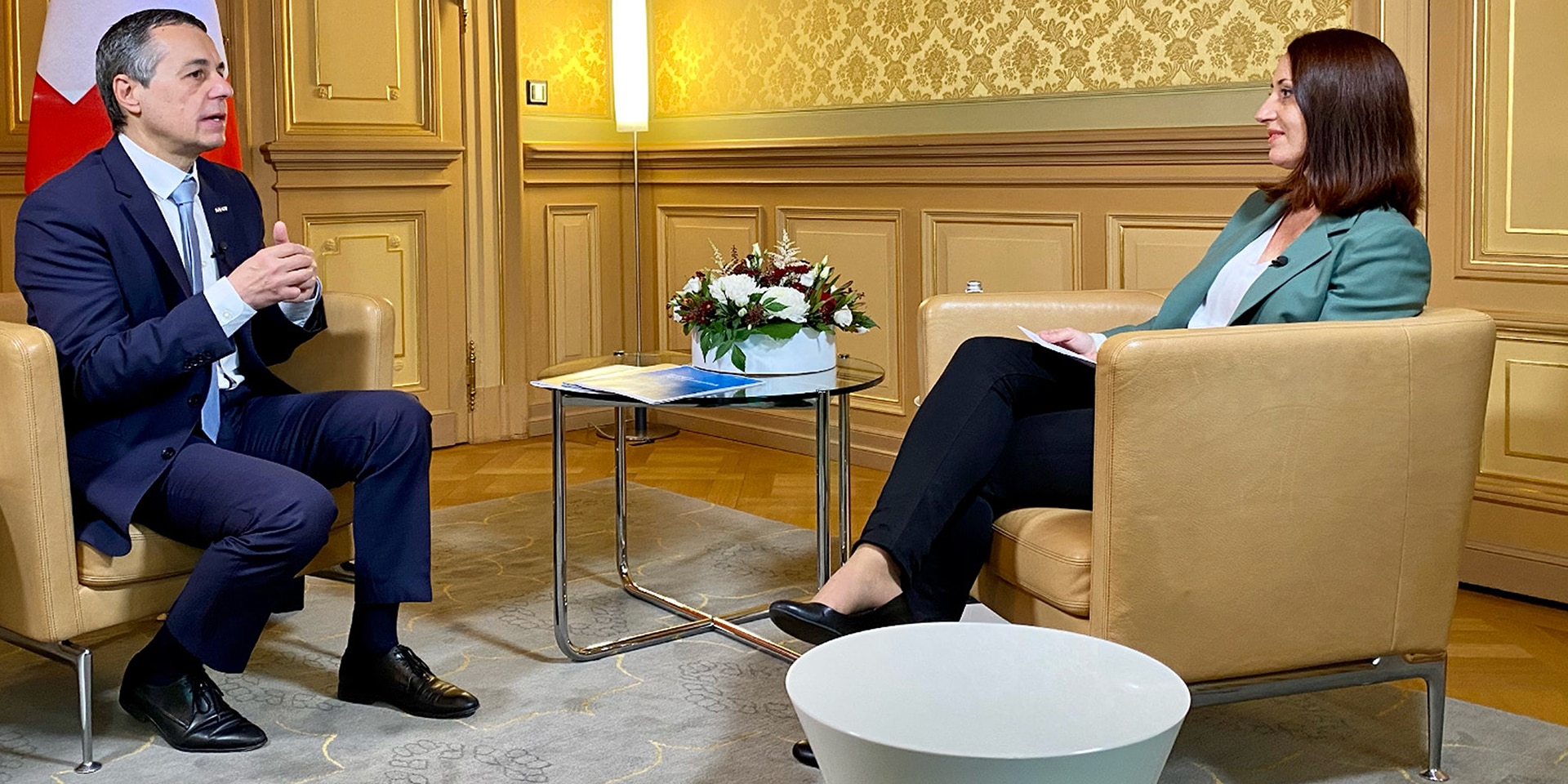Switzerland and ICRC adapt to the challenges of digitalisation
As long-standing partners, Switzerland and the International Committee of the Red Cross (ICRC) apply the same principles of humanity, neutrality, impartiality and independence to their humanitarian efforts. To respond more effectively to global challenges and increasing digitalisation, both parties signed a protocol on 27 November 2020 amending the agreement that governs the ICRC's status in Switzerland. What does this cooperation entail?

The ICRC manages its archives at its headquarters in Geneva. © Keystone
Let us rewind to 6 April 1994. The setting is Kigali, the capital of Rwanda. Civil war is raging between the Hutus and Tutsis. On this day, Président Juvénal Habyarimana was assassinated while returning from Tanzania to finalise a series of agreements setting out a road map to peace.
The reaction from Kigali-based radio station Radio Télévision Libre Mille Collines (RTLM) was euphoric. A few minutes after the attack, RTLM essentially took it upon itself to incite ethnic cleansing. It divulged on air the exact identities and addresses of Tutsis still in hiding across the country, sentencing these people to almost certain death. The genocide that followed, especially at the beginning, had much to do with the leaking of personal information that should have been kept confidential.
Imagine what would happen now in the era of new technology over two decades later if the same type of sensitive data found its way into the wrong hands again. Take the many people who endure tyranny in any of the various conflicts or crises around the world, like Syria, Myanmar, Democratic Republic of the Congo, and Niger. What if their biometric and medical data or details about their religion, family or whereabouts – information currently held in confidence by humanitarian organisations – were made public? Without doubt, disclosure of such highly sensitive data would lead to greater suffering.
The ICRC handles victims' personal data
This is where the International Committee of the Red Cross (ICRC) comes in. Headquartered in Geneva, the ICRC is Switzerland's main partner in the area of humanitarian aid. Intervening in difficult and complex situations is an integral part of the ICRC remit. As part of its work in sensitive regions around the world, the ICRC collates and processes a substantial body of data on victims as well as other highly sensitive information. This data allows the ICRC to fulfil its key role in protecting and helping the victims of armed conflict and other violent situations, and promoting international humanitarian law.
"Within its mandate, the ICRC must gather information about the situation on the ground," explains Corinne Cicéron Bühler, Ambassador and head of the Directorate of International Law (DIL) at the Federal Department of Foreign Affairs (FDFA). "Working in complex environments, the ICRC must be able to rely on all parties to any conflict. This involves winning the trust of these parties and, in particular, ensuring that these parties can provide the ICRC with information to help victims without this information being used against them, not least by other parties in the conflict."
The ICRC and Switzerland share the same humanitarian values. Both want to safeguard data more effectively in today's digital age. Digitalisation is also an area of priority in the Swiss Foreign Policy Strategy 202 –2023.
Amendment to the ICRC headquarters agreement in Switzerland
In 1993, Switzerland concluded a headquarters agreement with the ICRC ensuring that the organisation can operate independently from its Swiss base to help victims of conflict. Under this agreement, the ICRC has a specific legal status guaranteeing the organisation complete autonomy within an environment conducive to fulfilling its international mandate. The agreement was amended for the first time on 27 November 2020.
Cicéron Bühler: "The 1993 agreement no longer allowed the ICRC to meet the new challenges it faces. Switzerland has therefore amended the agreement but maintained the strong legal framework that underpinned the original accord. The new version addresses the challenges of digitalisation as well as the new realities facing the ICRC."
A revised agreement based on practical needs
Thanks to digitalisation, the ICRC is seeking to engage even more with vulnerable populations, providing them with greater support in a range of areas. This new agreement takes account of developments in recent decades surrounding the digitalisation of ICRC activities as well as the management and make-up of ICRC staff. The ICRC also needs its activities to be safeguarded more effectively and, in particular, its archives, documents, communications, sensitive information, and other data to be more secure. The revised headquarters agreement reinforces this protection.
Staff are a valuable asset to the ICRC. Vulnerable populations would not receive the help they need were it not for the unwavering commitment of the people who work for the organisation, often in extreme conditions and sometimes at great personal risk. These very people need a reliable employer who is willing to support them and offer them an appropriate benefit package. The new provisions to assist the ICRC have been introduced with this in mind, taking into account the highly diverse nature of the ICRC staff community.
"Responding to the ICRC's wish to have its headquarters agreement brought up to date is a way to strengthen relations between the two partners and help the ICRC fulfil its international mandate," says Cicéron Bühler, adding that the revised accord can serve as a template for agreements that the ICRC concludes with other countries.
Signing in Bern
At an official ceremony in Bern on 27 November 2020, Federal Councillor Ignazio Cassis and ICRC President Peter Maurer signed the protocol amending the agreement that governs the ICRC's status in Switzerland.



